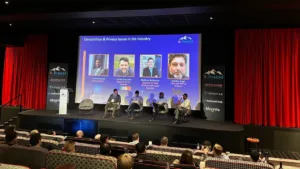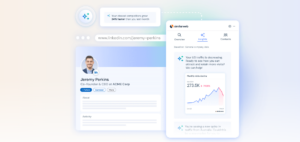By Kimberley Carstens, Research Executive and Andrew Darley, Head of Technology Sector, and co-Head of Research, Cavendish
Since 2017, an enterprise value of £23.3bn has been returned to AIM technology stakeholders in the form of 51 public takeouts, including 10 in 2023 alone. With UK valuations appearing cheap and looking more attractive than ever to potential acquirers, the Technology team at Cavendish has identified a number of trends of corporate and private equity bidders targeting AIM-listed technology companies since 2017, through the uncertainties of COVID, the war in Ukraine and its effects on the global economy and rising global inflation and interest rates into 2023.
Looking more closely at technology takeouts across the 2017-2023 pre-COVID, COVID, and post-COVID period, it’s clear that there are four key trends:
Volume vs value
During the COVID period, there was a decline in activity by volume but a sharp increase in takeout enterprise value. This is because acquirers took advantage of undervalued AIM-listed technology companies during this period which made larger transactions more attractive. The rate of takeouts slowed from 7-10 deals per year pre-COVID to a consistent 5-6 deals during COVID, showcasing the decline in activity. However, the pace of takeouts however has returned post-COVID with 10 transactions announced between Jan-Oct 2023.
The sharp increase in takeout enterprise value is evident in the five £1bn+ EV deals completed during COVID, up from two pre-COVID, of which three completed in 2022: Ideagen (£1.1bn), EMIS (£1.2bn) and Micro Focus (£5.1bn), raising total transaction EV during COVID to £12.8bn from £8.4bn pre-COVID.
Software is king
Software targets were most frequently bid for, and consistently valued at, a premium multiple during COVID compared with their non-software peers, as bidders were looking for and paying better multiples for Annual Recurring Revenue. Multiples for software targets remain at a premium to non-software companies, and this divergence continues in 2023 for EV/sales and EV/EBITDA multiples.
Software firms were the most likely takeout targets and were typically smaller than non-software peers. However the range of deal size varies: Micro Focus, an Enterprise Software company, was the largest software takeout since 2017, acquired by Open Text for £5.1bn in August 2022.
PE-backed acquirers vs trade bidders
Unexpectedly, as a rule of thumb, PE-backed acquirers did not pay a multiple premium during COVID, compared to trade (non-PE) bidders. Instead, multiple premiums depended on the characteristics of the target and whether the transaction was a platform or bolt on deal. High-margin, low-growth platform targets were acquired by direct PE during COVID at lower multiples than lower-margin high-growth bolt-on targets by indirect PE bidders. Furthermore, the acquisition premium has fallen between pre-COVID and post-COVID for transactions completed by direct PE-bidders, while the acquisition premium has increased for transactions completed by indirect PE-bidders for bolt-on deals.
On the other hand, trade bidders transacted on larger deals with higher revenue growth and multiples than both direct and indirect PE bidders during COVID. Trade bidders were most active during COVID, while bolt-ons by indirect PE acquirers at lower multiples have been most active so far in 2023.
During COVID, trade focused on larger software targets with revenues £180m+ including Wameja, IMImobile, EMIS (£181m revenue for £1.2bn EV) and Micro Focus (£2.1bn revenue for £5.1bn EV). This trend seems to be reversing in 2023, with trade completing on lower revenue targets (eg ECSC and Smoove).
UK vs US-domiciled acquirers
Finally, UK and US-domiciled acquirers both targeted AIM tech companies to a similar extent across the whole period; and UK-domiciled acquirers transacted on a greater scale during COVID totalling £3.7bn compared to £3.1bn by US-domiciled acquirers in contrast to the broader narrative that targets are only targeted by US-domiciled acquirers Across the whole period, US-domiciled acquirers completed 20 transactions for a total £7.8bn EV, a similar frequency to the 19 transactions by UK-domiciled acquirers, but more than the UK-acquired total enterprise value of £5.5bn.
As expected, US-domiciled acquirers paid a multiple premium pre-COVID and during COVID compared to UK-domiciled acquirers, while multiples returned to similar levels in 2023. US and UK domiciled acquirers also targeted different company fundamentals: US-domiciled acquirers paid a multiple premium for higher growth prospect targets compared with UK-domiciled acquirers; while UK-domiciled acquirers focused on EBITDA profitability.
Surprisingly during COVID, UK-domiciled bidders were more likely to be direct PE acquirers transacting to build a platform, whereas US-domiciled acquirers were more likely to be trade bidders.
Looking back, the four highlighted trends above confirm that during COVID, software targets commanded premium multiples compared to non-software targets, and US-bidders paid a multiple premium compared to UK-domiciled bidders. It also indicates the nuance in public takeout activity: multiple and acquisition premia differ between platform and bolt-on PE-backed bidders and UK-domiciled bidders were more likely to transact on platform deals than US-domiciled bidders during COVID.
Looking forward, there has been an acceleration in takeouts in 2023. This year, AIM tech takeouts include AdEPT by Wavenet, 7Digital by Songtradr, ECSC by Daisy, Kape Technologies by Unikmind, Blancco by Francisco Partners (yet to complete), Glantus by Basware, Osirium by Sailpoint/Thoma Bravo, Instem by Archimed, Smoove by PEXA and Tribal by PE-backed Ellucian. These ten takeouts indicate that even if bidders are cautious against an uncertain macroeconomic backdrop, they have remained willing to deploy £2.1bn in appreciation that UK AIM-listed technology businesses are currently typically undervalued.









